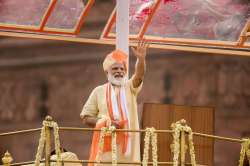Menstruation, a taboo that died on August 15: Why PM Modi deserves praise for 'sanitary pad' mention
Menstruation is a natural biological process but the shame, heavy stigma and misconception attached to it is prevalent even today. Nobody really expected the subject to figure in Prime Minister Narendra Modi's Independence Day speech. But it did. Read on!

Menstruation is a natural biological process but the shame, heavy stigma, and misconception attached to it is prevalent even today. Nobody really expected the subject to figure in Prime Minister Narendra Modi's Independence Day speech. But it did. When Prime Minister Narendra Modi spoke from the ramparts of the iconic Red Fort on August 15 this time, he left everyone in awe. "This government has been always concerned about the health of our daughters and sisters. Through 6,000 Jan Aushadhi centers, about 50 million women have got sanitary pads at Re 1. We have worked for women's empowerment. Navy and Air Force are taking women in combat roles...women are now leaders," PM Modi said in his I-Day address.
It was unprecedented. The subject was untouched for long. In schools, silence prevails during a biology class when menstruation is taught. All they feel comfortable doing is whispering into each other's ears and some even drop out of school. Pharmacists and shopkeepers, most of the time, have an embarrassed look on their face while selling sanitary napkins. They make it a point to cover it in dark packets or opaque bags. Such is the taboo.
It doesn't end here. Since ages, menstruating women have been considered impure. They are excluded from religious, social, and community participation. At times, they are also seen as physically or biologically weak and less competent.
According to a report commissioned by the United Nations Population Fund (UNFPA) shame, taboo, and misconception surrounding menstruation lead to exclusion and discrimination of girls and women.
The talk around menstruation and sanitary napkins discomforts many. It is not usually a part of men's vocabulary. And, having the prime minister speak about it during a national address empowers not just women but families.
Although there has been a lot of progress regarding women's reproductive health, the conservative mindset still refuses to change. The sheer hesitation reflects in the connotations attached to menstruation. 'Down', 'Chums', 'that time of the month' are synonymous with menstruation. This is what the subject has been restricted to till now.
The taboo is so deep-rooted in the common psyche that often girls, especially in workspaces, are hesitant to explain the real reasons behind them feeling sick or low. "Under the weather" or "not well" -- that's what girls usually cover it up with whenever they have menstrual cramps or even worse health issues. Recently, food delivery company Zomato announced it will give women employees up to 10 days of "period leave" per year, as part of an effort to combat stigma around the issue. "There shouldn't be any shame or stigma attached to applying for a period leave. You should feel free to tell people on internal groups, or emails that you are on your period leave for the day." Zomato chief executive Deepinder Goyal said in an email sent to the staff members. The initiative is praiseworthy. It inspires more people to come forward, talk about the subject, and address it wisely.
Prime Minister Narendra Modi's open and unhesitating mention is also being seen as the beginning of breaking this taboo. "Progress is impossible without change and those who cannot change their minds cannot change anything," George Bernard Shaw had once said.
The next time you hear about menstruation, don't feel uncomfortable. Talk about it openly. No girl should feel ashamed of menstruating. Her confidence shouldn't diminish with that red stain on her clothes or the spare pad she carries in her bag.
Menstruation is a part of life. Period.